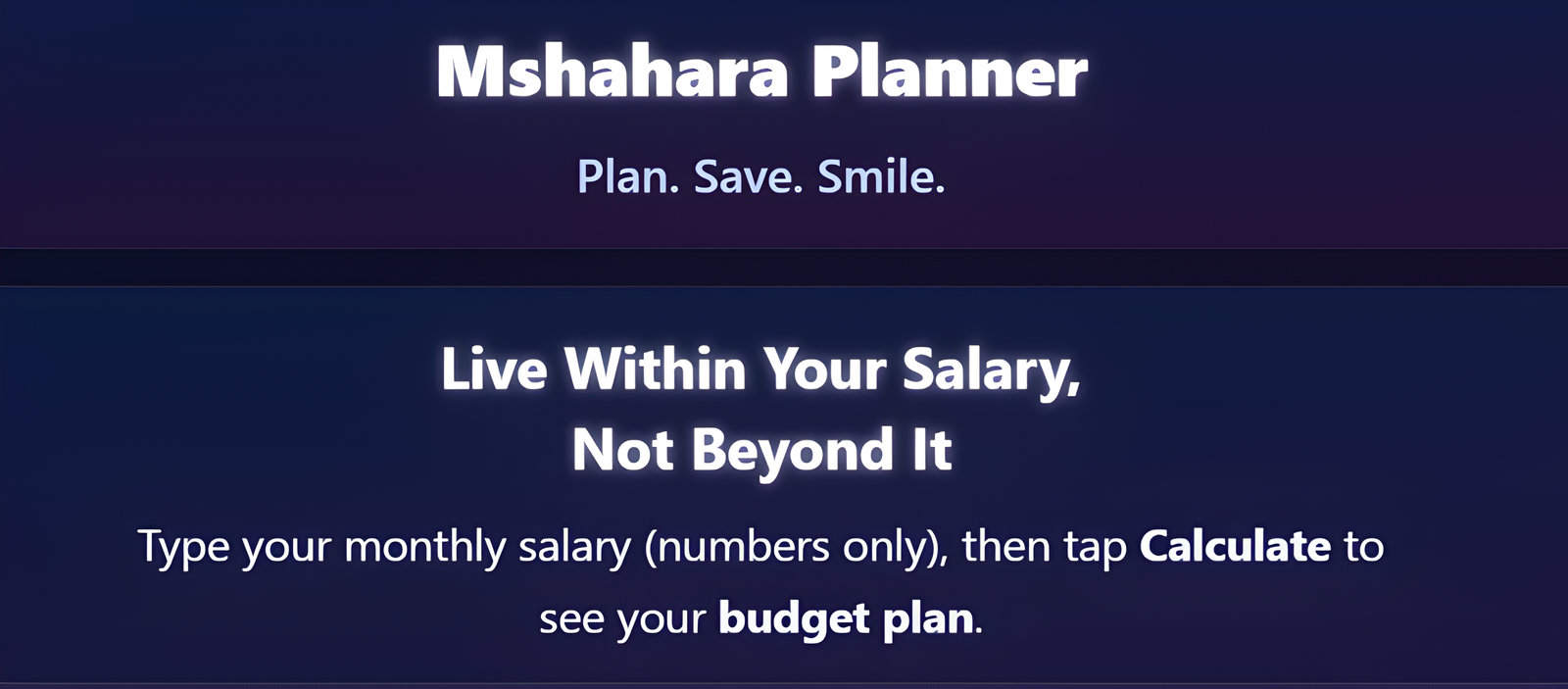Budget Mkononi – Free Money Planner for Kenyans
Budget Mkononi: How Kenyans Can Take Control of Their Finances with Simple Tools
Introduction: Why Money Management Feels Hard in Kenya
Every month, thousands of Kenyans ask themselves the same question: “Where did my salary go?” Rising living costs, unpredictable expenses, and the temptation of mobile loans have made financial stability a daily struggle. Many people earn enough to cover their needs, but without a proper plan, the money disappears before mid-month.
That’s exactly why Budget Mkononi was created — a simple, all-in-one hub for everyday budgeting. Instead of complicated spreadsheets or foreign apps that don’t match the Kenyan lifestyle, it gives you easy tools to plan your mshahara, cut unnecessary costs, and stay financially disciplined.
What Is Budget Mkononi?
Budget Mkononi is a free Kenyan budgeting platform that helps you manage your salary and expenses using practical tools. The name Mkononi means “in your hand” — showing that your financial control is always just a tap away.
Unlike traditional financial apps, Budget Mkononi doesn’t overwhelm you with complex graphs or banking jargon. It focuses on what really matters:
- Your salary (mshahara) and how to split it wisely.
- Food shopping — one of the biggest expenses in most households.
- Daily needs such as rent, transport, and school fees.
- Debt traps — including those quick mobile loans that seem helpful but cost you heavily.
- Savings & emergencies, so you’re never caught off guard.
With Budget Mkononi, you no longer need to wonder where your money went — you can see it, plan it, and control it.
The 60/20/20 Rule: A Simple Guide for Your Salary
One of the standout features of Budget Mkononi is the 60/20/20 rule. Here’s how it works:
- 60% for needs → rent, food, transport, school fees, utilities.
- 20% for savings → emergency fund, Sacco contributions, retirement plan, or investment.
- 20% for wants → entertainment, shopping, eating out, or small luxuries.
This rule prevents overspending while ensuring you’re not just surviving, but also saving and enjoying life. For a salary of KSh 50,000, for example:
- KSh 30,000 goes to needs.
- KSh 10,000 goes to savings.
- KSh 10,000 goes to wants.
It’s a flexible formula that works no matter how much you earn — the key is consistency.
SupaMarket Basket: Taming the Food Budget
For most families, food shopping is the number one monthly expense. Without discipline, it can easily consume half of your income.
Budget Mkononi’s SupaMarket Basket tool helps you track, compare, and cut food costs. Instead of walking blindly into the supermarket and overspending, you get a clear plan for how much to spend on essentials like maize meal, rice, cooking oil, vegetables, and proteins.
With rising prices, having a fixed shopping budget keeps you disciplined. You’ll know what to buy, what to cut, and how to avoid those impulse purchases that drain your wallet.
Staying Ahead of Rent, Fees, and Transport
Kenyan households also struggle with recurring expenses — rent, school fees, and transport. These costs are predictable but still catch people off guard because they don’t plan ahead.
Budget Mkononi allows you to map out these fixed expenses in advance. By allocating them into your 60% “needs” category, you avoid scrambling at the last minute or borrowing from mobile lenders.
It turns chaotic living into organized financial planning.
Avoiding Debt Traps and Mobile Loan Surprises
Mobile loans are everywhere in Kenya — quick, tempting, and dangerous. While they may solve a short-term problem, they create a long-term cycle of debt.
Budget Mkononi teaches you to budget within your means and avoid relying on high-interest loans. By setting aside money for emergencies and using the 60/20/20 rule, you reduce the chances of falling into debt traps.
Instead of being controlled by mobile apps that charge you silently with penalties, you control your finances with a free, transparent tool.
Building Savings and Emergency Cushions
Unexpected costs — medical bills, job loss, or family emergencies — are part of life. Without savings, such events force many families into debt.
Budget Mkononi encourages you to put aside at least 20% of your salary for savings. Even if you start small (KSh 1,000 a month), the consistency adds up. Over a year, that’s KSh 12,000 — enough to cover school fees, repair a car, or handle a medical bill.
It’s not about how much you save, but about building a habit that gives you peace of mind.
Why Kenyans Should Trust Budget Mkononi
Many financial apps are designed for other countries, making them unrealistic for Kenyan users. Budget Mkononi stands out because:
- It’s localized — built with Kenyan expenses in mind.
- It’s simple — no complicated dashboards.
- It’s accessible — free, mobile-friendly, and easy to use.
- It’s practical — designed for everyday needs like mshahara, school fees, and transport.
This makes it a trustworthy solution that truly understands Kenyan life.
How to Get Started
Getting started with Budget Mkononi is simple:
- Visit the official page: https://tujulishane.com/budget-mkononi/
- Explore tools like the 60/20/20 salary planner and SupaMarket Basket.
- Enter your income and expenses to get a personalized budget.
- Stick to the plan — and adjust monthly as life changes.
Within a few weeks, you’ll notice more financial discipline, reduced stress, and even leftover savings.
Conclusion: Take Control of Your Money Today
Financial freedom doesn’t come from earning millions — it comes from managing what you already have. With Budget Mkononi, every Kenyan has access to a free, smart, and practical tool for money management.
Whether you’re a young professional in Nairobi or a parent running a household upcountry, this platform makes it easy to plan, save, and avoid debt traps.
Take the first step today by visiting Budget Mkononi and put your financial future back in your hands.
Disclaimer: Content on Tujulishane is for informational purposes only and should not replace professional advice.

